Abigail Croker is a PhD Student in the Centre for Environmental Policy, funded by the SSCP DTP, Grantham Institute, and affiliated with the Leverhulme Centre for Wildfires, Environment and Society. In this post, she tells us about the challenges the world faces when tackling wildfires in the era of climate change. Her fieldwork in the Tsavo Conservation Area in Kenya tells us that we need to look beyond the Global North for fire management practices.
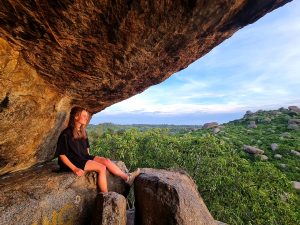
Wildfires are increasing in frequency and intensity across the world, increasing greenhouse gas emissions, threatening biodiversity and ecosystem functioning, and endangering livelihoods. Savannahs are fire-prone biomes that account for 86 per cent of all global fire events. They extend over half of the African continent and contribute to over two-thirds of global savanna CO2 emissions. Yet, in comparison to other world regions, fires in sub-Saharan Africa receive far less media attention – an unreported threat.
Sub-Saharan Africa has undergone a recent pyric transition. Historically, fires were lit by diverse indigenous peoples and local communities for a range of subsistence and resource management objectives, and these controlled fires contributed to the coevolution of humankind, savanna ecosystems, and megafauna over millennia.
In more recent history, European colonial administrations introduced strict wildlife conservation policies based on popular Western notions of minimising all human intervention and contact with nature. As a result, policies have been passed that ban all local burning practices on the premise that they are destructive and cause forest degradation. This has silenced diverse fire management practices and has resulted in extreme wildfire regimes in protected areas, where large high intensity fires exceed natural variability levels and outstrip local firefighting capacities due to an accumulation of flammable biomass. Outside protected areas, livestock have replaced fire as the dominant fuel consumer, and soil erosion and bush encroachment are accelerating.
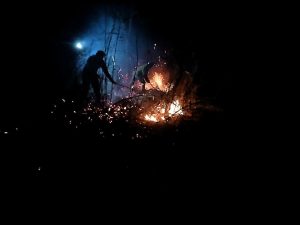
Of course, climate change – rising temperatures, prolonged drought conditions interspersed with heavy rainfall and pluvial flooding events, strong winds, and declining soil moisture (to name but a few) – have exacerbated wildfire challenges, now, and in the future.
My research explores the opportunities for Community-Based Fire Management (CBFiM) as an alternative ‘bottom-up’ fire management framework to address these wildfire challenges. This framework is increasingly heralded as an inclusive and effective approach, yet there has been limited research into its characteristics and application across conservation landscapes.
Co-creating fire management practices
To identify realisable and practical fire management solutions across conservation landscapes, I decided I wanted to take a trip to the region and learn first-hand from diverse stakeholders and rights-holders about their fire knowledges, beliefs, and practices. I asked the peoples who have used fire for millennia: “What are the challenges and how can we co-create knowledge to address these?” I would let the field speak to me.
With funding support from the Leverhulme Centre for Wildfires, Environment, and Society, and the Grantham Institute, and the unfaltering encouragement from my department, the Centre for Environmental Policy (CEP), my research idea was suddenly catapulted into reality. In recognition of the need to decolonise my fire science, I wanted to collaborate with local researchers who are far more knowledgeable about this region than I am or will ever be. I reached out to local research institutions, universities, and NGOs, and was kindly welcomed to Kenya by the Centre for Biodiversity Information Development (BID-C), based at Strathmore University – the start of what I hope will be a long and fruitful collaboration.
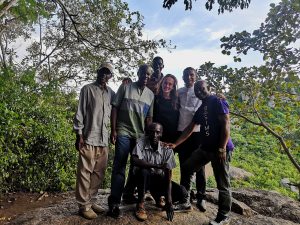
I spent five months working across the Tsavo Conservation Area in Southern Kenya, exploring opportunities for CBFiM to address the increasing challenges associated with large wildfire events and exclusionary conservation management. I had the opportunity to attend the International Rangers’ Day celebrations at Kasigau ranch; shake hands with Kenya’s most prolific conservation figures and strong women rangers challenging the status quo; meet community chiefs in roadside cafes; share tea with KWS officers in their colonial-built offices situated amongst the bush in Tsavo and Chyulu National Parks; stroll amongst the bomas conversing with members of the Maasai Group Ranches; share fruits with members of the Kamba, Taita, Taveta, and Giriama communities in their homesteads. It is safe to say I learned a lot from these peoples and their cultures.
That is not to say it was easy – it was quite frankly the most challenging five months of my life. I often felt despondent and isolated, with no sense of belonging. One lovely local lady, just near the gates of Amboseli National Park, saw me strolling alone at 6am in the morning shadows of Mount Kilimanjaro and invited me in for a coffee. She gave me her mother’s blessing and reminded me that challenges are a part of life, and are often the most enriching, life changing, and incredible experiences one can go through. She was right.
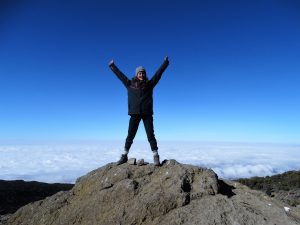
Decolonising fire science
The Leverhulme Centre for Wildfires, Environment, and Society has recognised the colonial legacies embedded in our knowledges, research methodologies, institutions, and scholarly endeavours. I’ve been involved in organising a series of workshops aimed at decolonising fire science, inviting speakers from South Africa and Sierra Leone who have been in this field to share their wisdoms with us, and discuss the practical ways that we, as a research centre and as early-career researchers, can decolonise our practices and co-create knowledges with local and indigenous peoples worldwide.
We’ve begun working towards a tool-kit to guide us in this process towards a more equitable and inclusive research practice, spanning both the physical and social sciences. To put our conversations into practice, as well as to begin establishing long-term partnerships with international institutions where our research projects are situated, the Leverhulme Centre and BID-C collaborated on hosting an inter-cultural workshop in Nairobi.
The workshops and events I’ve been involved in invites stakeholders and rights-holders from across contested fire-prone landscapes in Kenya to share their worldviews and fire knowledges on addressing wildfire challenges. For example, I helped run an exploratory and training workshop with centre members at Royal Holloway that ran in parallel to the sessions in Nairobi. We frequently came together over the two days to share ideas, experiences, and questions. This included a range of methods to explore diverse knowledges and perspectives, including rich pictures, world café, participatory art and video, live art, presentations, and the development of a joint declaration. The latter was designed and deliberated by workshop participants in Nairobi, outlining the key requirements for an effective and equitable fire management policy in Kenya, which we all signed as the first step in this initiative.
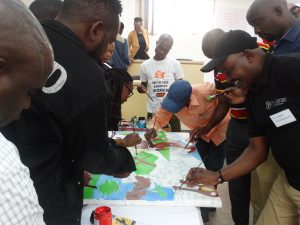
The fieldwork I went on deeply shaped my perspectives as a researcher. If you are thinking about doing fieldwork, absolutely go for it. Take that leap and contact all your known and unknown networks. Go into the process knowing it can be both incredibly challenging and enriching, which I have learned are inseparable. And while you are carrying out your fieldwork, remember to keep your eyes wide open – it is not all about the data you collect and return to London with, but the experiences you have, the peoples you meet, and your growth as an independent researcher.
In reading this, it just confirms the sense of pride and privilege I feel in being Abi’s father. Her work in taking on a part of mankind’s responsibility to our planet is inspiring, and it is very reassuring to know there are so many across the world who are on similar missions. Huge credit to you all.